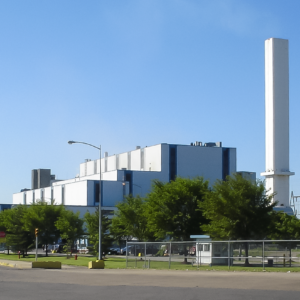The Covanta trash-to-steam power plant in Chester continues to swirl at the center of a debate over environmentalism and pollution following a contentious conference call with county residents this week.
Officials with the plant spent more than two hours on Tuesday night talking to Chester residents on a Zoom conference. Plant staff spoke on a new $4 million management process they claim will reduce emissions and better protect the surrounding community.
The company plans to install equipment to spray aqueous ammonia inside the plant’s chimneys to reduce Nitrogen Oxide (NOx). The process will cost an additional $1 million per year to operate.
Officials said the ammonia solution used is 19 percent ammonia to water, compared to the household cleaner at 10 percent. It will bind with the NOx so the gas does not reach the atmosphere.
Dom Cammarata, asset manager for the Chester plant, said the facility emits less NOx than similar plants in Plymouth Meeting and Lancaster, which have more up-to-date equipment.
John Scott, director of government relations for Covanta, said Westinghouse built the plant in 1992. Covanta began operating it in 2005. The company has an “environmental justice” policy and works with the county government to reduce emissions and provide various programs for residents and students.
The plans call for a closed tank for the ammonia and a concrete basin surrounding it in case of a leak. The project will begin once the plant has secured Pennsylvania Department of Environmental Protection permits.
Joe Walsh, an environmental scientist with Covanta, said people may have heard about the danger of ammonia gas, but the liquid is safe.
“We are not going that route,” he said. “We have safely used ammonia mixtures at 85 of our plants for many years. I’d say we are very well versed in the safe management of ammonia mixtures.”
Delivery of the ammonia will add about two more trucks a week, he said.
Many residents and others who asked questions during public comment were skeptical about the plan. The Covanta plant has been a political football in Chester for years, with people claiming it contributes to asthma, cancer, and other health issues experienced by local residents.
Proponents argue Covanta provides funds for the cash-strapped town. Covanta pays Chester $5 million annually and additional fees to the city and Delaware County.
One resident wondered why Covanta did not simply install a newer emissions system on the Chester plant. The answer: The plant is old, and the technology to retrofit it does not exist.
Resident Will Richan asked about ash created by the incinerator that ends up in landfills and whether it leaches contaminants into the groundwater.
“On the ash, you refer to it as toxic ash. Ash is not toxic. It’s not hazardous,” Cammarata said. If it were, the company would not be able to send it to a general landfill, he said.
Zulene Mayfield, chair of Chester Residents Concerned for Quality Living, claimed the 18 percent reduction in the NOx emission is a “paltry thing.” She said her group has asked Covanta to lower its emissions for years. She also dismissed the scholarships and other community programs that Covanta provides.
“The whole thing is, we do not want you in our community,” said Mayfield.
Some residents complained about the Zoom format, saying many in Chester lack computers and older people were left out. They called for an in-person meeting.
Leah Kelly, a lawyer with the Environmental Integrity Project in Washington, D.C., said it was wrong to imply that installing the new pollution controls is a “voluntary act.”
Instead, she argued, the EPA has tightened the rules. Nitrogen oxides are a “primary contributor to ozone,” she said. Also, she said the federal EPA standards that Covanta officials say their plant exceeds are outdated.
Eileen Flanagan, with Earth Quaker Action Team, asked the Covanta employees if they would like to live near an incinerator. Cammarata said the plant has about 100 employees. Of those, 20 percent live within five miles of Covanta.
Skip Jones asked if there are differences between emission levels for plants in EPA-designated environmental justice areas and other areas. The Covanta employees could not answer that question but promised to investigate it.
Michael Van Brunt, vice president of environmental permitting and sustainability, said he’d had asthma since childhood. He said research shows NOx could trigger asthma. Other sources of pollution trigger it as well.
The Chester plant serves area municipalities and businesses to provide “landfill-free disposal.” It processes 1.3 million tons of waste yearly, recycles 55 tons of metal, and generates enough electricity to power 48,000 homes.
Please follow DVJournal on social media: Twitter@DVJournal or Facebook.com/DelawareValleyJournal

